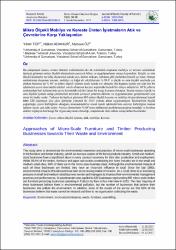Approaches of Micro-Scale Furniture and Timber Producing Businesses towards Their Waste and Environment.
Access
Attribution 3.0 United Statesinfo:eu-repo/semantics/openAccesshttp://creativecommons.org/licenses/by/3.0/us/Date
2017-12Access
Attribution 3.0 United Statesinfo:eu-repo/semantics/openAccesshttp://creativecommons.org/licenses/by/3.0/us/Metadata
Show full item recordAbstract
This study aims to demonstrate the environmental awareness and practices of micro-scale businesses operating in the furniture and timber industry, which are two sub-sectors of the forest products industry. Small and medium-sized businesses have a significant place in every country's economy for their size, production and employment. While 99.9% of the timber, furniture and paper sub-sectors constituting the forest industry are in the small and medium-sized class, 96% of them are in the micro-scale business class. Although the environmental impacts of each of these businesses are limited, they have an important influence in total. Since the late 1980s, environmental impacts of businesses have been an increasing matter of concern. As a result, there is an increasing pressure on small and medium-sized business owners and managers to improve their environmental management practices and performances. A questionnaire was applied to 120 businesses representing 885 micro-scale timber and furniture producing businesses operating in Trabzon by face to face interview in 2015. The clear majority of these businesses believe there is environmental pollution, but the number of businesses that believe their businesses less pollute the environment. In addition, some of the results of the survey are that 66% of the businesses believe that waste cannot be reduced and there is no organization collecting the waste.
Collections
The following license files are associated with this item:



















